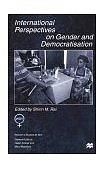

Published in Democratization, 8: 4 (Winter 2001)
This edited volume is a useful addition to the growing literature on gender and democratisation, although it breaks little new ground. The cases explored in International Perspectives on Gender and Democratisation are gratifyingly broad, with chapters evaluating the evolving status and identities of women in Mexico and Guatemala, Pakistan and India, Botswana and South Africa, and the Arab world.A couple of common themes run through many of the contributions. The first is the difficulty of securing a public role for women in societies where they have generally been consigned to the private, domestic sphere - perhaps increasingly so when democratisation adopts a reactionary stance towards the "proper" role of women. In East-Central Europe, writes Barbara Einhorn, "many women feel that the corrosive effect of new/old rhetoric about their primary sphere of responsibility being the family, has eaten into the way they relate to their paid employment" (p. 107). This is true, at least, for those women lucky enough still to earn a wage in societies where, since the onset of democratisation, "women have constituted the majority of unemployed people in all countries of the region bar Hungary and Slovenia" (p. 106). A possible ameliorative strategy is the introduction of quotas for women's representation in the political sphere. The "Reservation for Women" debate in India is ably analysed by Shirin Rai and Kumud Sharma; its counterpart in the South African context is explored by Lindiwe Zulu, who points to the considerable "success achieved by ANC [African National Congress] women in arguing for institutionalising women's participation in South Africa's new political organisations" (p. 170).
 Another central theme of International Perspectives on Gender and Democratisation is women's activist role - both in the
opposition movements that play a critical role in undermining authoritarianism, and in the civil-society networks that
proliferate as democratisation unfolds. In Guatemala, note Cathy Blacklock and Laura Maconald, "the political work of the
women's organisations" has effectively challenged "the conventional understanding in the discourse of human rights that
civil and political rights underwrite, safeguard and ensure citizenship," although "gendered imbalances and silences" remain
(p. 35). Einhorn's study of the East-Central European transitions sounds a cautionary note, reminding us that such
participation can easily fall prey to "the 'civil society gap' or 'trap,'" with a market-oriented decline in state services being
compensated for "by the unpaid (and largely unacknowledged) caring labour of women" (pp. 111-12).
Another central theme of International Perspectives on Gender and Democratisation is women's activist role - both in the
opposition movements that play a critical role in undermining authoritarianism, and in the civil-society networks that
proliferate as democratisation unfolds. In Guatemala, note Cathy Blacklock and Laura Maconald, "the political work of the
women's organisations" has effectively challenged "the conventional understanding in the discourse of human rights that
civil and political rights underwrite, safeguard and ensure citizenship," although "gendered imbalances and silences" remain
(p. 35). Einhorn's study of the East-Central European transitions sounds a cautionary note, reminding us that such
participation can easily fall prey to "the 'civil society gap' or 'trap,'" with a market-oriented decline in state services being
compensated for "by the unpaid (and largely unacknowledged) caring labour of women" (pp. 111-12).
This reader was initially surprised to see case-studies of Britain and Australia included in the volume, since these "settled" democracies are rarely classed as part of the global democratisation process. But the chapter by Joanna Liddle and Elisabeth Michielsens on "Gender, Class and Political Power in Britain" lays such reservations to rest: it is one of the most stimulating in the book. Much of the chapter consists of a comparison between the experiences of a pseudonymous woman politician ("Ellen Gray") and a male counterpart ("Charles Smythe"), intended to establish that whereas "middle-class femininity is constituted by power deficits in the political field ... middle-class masculinity is constituted by a [sense of] self-evident or natural authority" (p. 130). The profile of "Smythe" seems a bit of an ambush - the authors scarcely bother to conceal their contempt for this priggish specimen - and it is questionable how representative "Gray's" experiences truly are of the female political class in Britain ("Gray" herself notes that "there were very few women in political life, particularly in the House of Commons, with my sort of background" [p. 140]). Nonetheless, the chapter offers powerful insights into the challenges and dilemmas that confront women seeking to move from traditionally female occupations and identities into the male-dominated realm of formal politics.
As with nearly all books written from a feminist perspective, the word "gender" in International Perspectives on Gender and Democratisation could as easily be replaced by "women." One wonders whether we will at some point see a more inclusive approach to the gender variable in analyses of democratisation and its concomitant market reforms. What, for example, might the catastrophic decline in the life expectancy of Russian men in the 1990s tell us about the gendered impact of democratisation and market liberalisation? How do the privatising and "modernising" trends that standardly characterise these processes affect males whose careers have been welded to work in heavy industry and the state sector? How are men's perceptions of their family role transformed in the democratising environment? These are perhaps subjects for a different book; but it is one that deserves to be written.